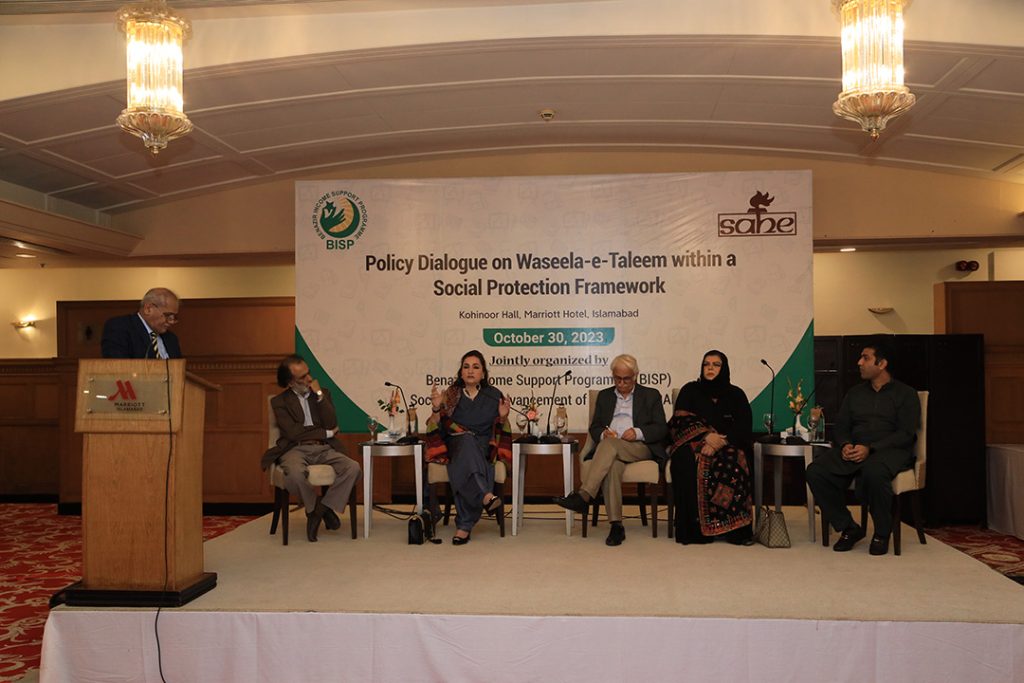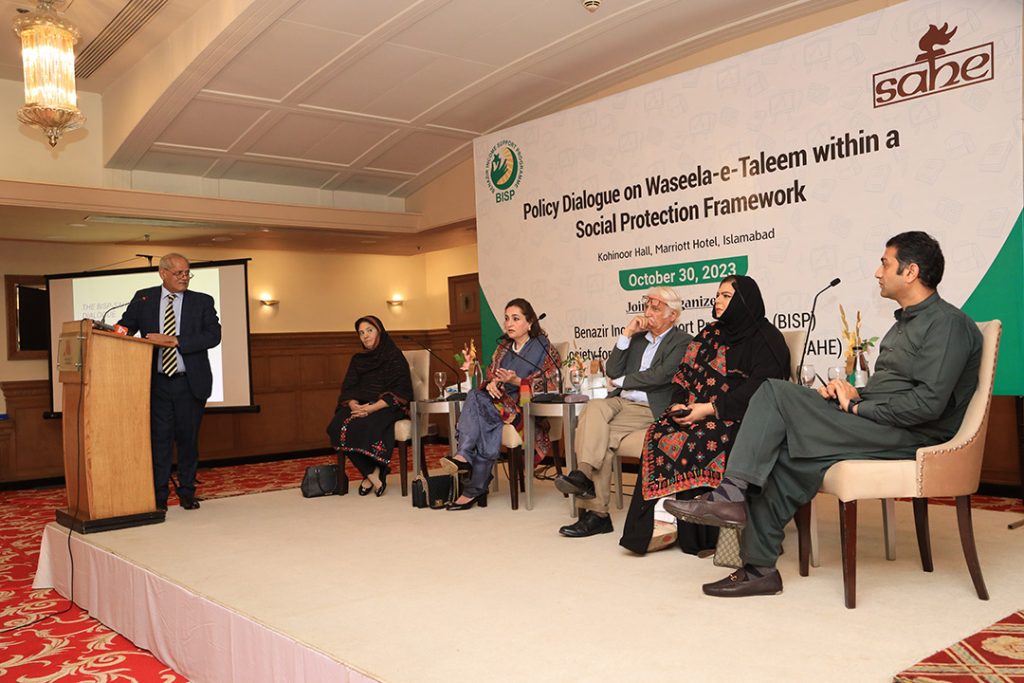SAHE and BISP jointly organized a Policy Dialogue on Waseela-e-Taleem (WeT) within a Social Protection Framework
Venue: Marriott, Islamabad
Date: October 30, 2023
Time: 2:00pm to 5:30pm
 Society for the Advancement of Education (SAHE) and Benazir Income Support Programme (BISP) jointly organized a Policy Dialogue on Waseela-e-Taleem (WeT) within a Social Protection Framework on Monday, October 30, 2023, Kohinoor Hall, Marriott Hotel, Islamabad
Society for the Advancement of Education (SAHE) and Benazir Income Support Programme (BISP) jointly organized a Policy Dialogue on Waseela-e-Taleem (WeT) within a Social Protection Framework on Monday, October 30, 2023, Kohinoor Hall, Marriott Hotel, Islamabad
BISP is running one of the largest social safety net programmes in Pakistan. BISP is assisting eligible millions of poor families through the Conditional Cash Transfer (CCT) programme in the form of Waseela-e-Taleem (WeT) for all BISP beneficiary households, to support primary schooling. BISP has recently moved into the area of middle school/lower secondary education for girls with a view to encouraging BISP/WeT beneficiaries to take advantage of the opportunity for secondary school education for their girls. However, lower secondary education for girls comes with its own set of unique challenges, not least by way of access and mobility.
The question that the SAHE study seeks to engage with is: How does the dynamic of accessing education for WeT-recipient girls change in the course of the transition from primary to lower secondary education? The presentation based on the SAHE study was preceded by a presentation by the DG BISP outlining the role of BISP in the social protection endeavor and the national scope of the program. Girls’ access to lower secondary schooling was a key aspect of the deliberation among the multiple stakeholders present, including practitioners, parliamentarians, and policy-makers on girls’ schooling.
The dialogue was graced by distinguished speakers including Senator Ms. Sana Jamali, Convener, Education Parliamentarian Caucus; Ms. Mehnaz Akber Aziz, Former MNA and Chief Executive and Founding Director of Children Global Network (CGN) Pakistan; Senator Ms. Sahar Kamran; and Senator Farhatullah Babar who highlighted the need to support girls education and particularly supporting girls access to middle/lower secondary schooling. Senator Babar appreciated the contribution of WeT in educating girls in Pakistan and its expansion to post-primary schooling. He said, “Educating one girl means educating a whole family and a whole society.” He pointed out that there is a huge disparity between the populations of children and schooling facilities available at the regional level. Referring to the issue of the high rate of population growth, he said that the system of allocation of funds at the provincial level by way of NFC also needs to be reviewed, in this context.
Former MNA Mehnaz Akbar Aziz, shared her constituency-level experiences of how WeT is helping girls and supporting the marginalized segments of society. She highlighted the need to identify out-of-school children by region and have parliamentarians and local governments share in the responsibility of managing the issue. Population growth is high amongst the vulnerable families. Therefore, there was a need to develop a linkage between out-of-school children of vulnerable families with BISP. She was of the view that parliamentarians should be apprised of such matters at regular intervals and expressed an interest in playing a facilitative role.
Senator Sahar Kamran talked about Article 25-A and the gaps in its implementation because institutions have made little effort to ensure that children have equal access to education. She specifically highlighted how important girls’ education is in economic development and particularly middle and secondary-level schooling. She was of the view that in girls’ context transport plays a central role in ensuring access to post-primary education. The senator emphasized the need for enhancement of budget allocations for education. She said social reasons that inhibit girls’ education, such as early marriages can be effectively dealt with at the constituency level.
 Senator Sana Jamali highlighted how the education caucus was formed and its objectives and work. The senator particularly emphasized the need for appropriate safety standards in the context of girls schooling.
Senator Sana Jamali highlighted how the education caucus was formed and its objectives and work. The senator particularly emphasized the need for appropriate safety standards in the context of girls schooling.
Mr. Javed Malik, Programme Director at the Malala Fund observed that given the extensive coverage of marginalized groups by BISP and other provincial-level initiatives there needs to be a more accurate assessment of the numbers of out-of-school children. He endorsed the idea that more funds could be made available for girls education.
Mr. Naveed Akbar, DG BISP talked about the Education deficit and Social Protection interventions being provided to marginalized segments of society and financial commitment that is being supported for the marginalized segments of society and conditional cash transfer in a broader Social Protection framework.
Mr. Abbas Rashid, Executive Director, SAHE presented the preliminary findings from the study, supported by the Malala Fund. For instance, BISP was being able to target the appropriate households which were appreciative of the support but asserted the need for as much as a four-fold increase in funds; most girls who had completed primary school with the support of BISP/WeT had gone on to middle/lower secondary school; school distance from home to middle or high school is considerably greater compared to primary schools and in that context the cost of transport for children going to school had risen sharply in the last one year posing a challenge for parents who wanted to continue their girls education. He argued that urgently needed funds must be provided to education and that our elites needed to make a distinction between self-interest and enlightened self-interest.
In addition, some findings from transport initiatives such as those pertaining to Islamabad Capital Territory (ICT), KP, and Punjab were also shared with a view to lessons learned.
Dr. Faisal Bari Senior Research Fellow at the Institute of Development and Economic Alternatives, and an Associate Professor of Economics at LUMS) highlighted the need for reviewing subsidies to the privileged sections of society while not taxing them appropriately. He also cited the National Human Development Report (NHDR), 2020 to point out that together these amounted to a huge sum of over PKR 2 trillion. He argued for the provision of targeted support.
The findings of the study were well-received by stakeholders including BISP Provincial representatives and practitioners representing diverse fields of education and social protection. They shared their perspectives in the reflections and discussion session and argued for bringing in more children who have limited means to access education.
